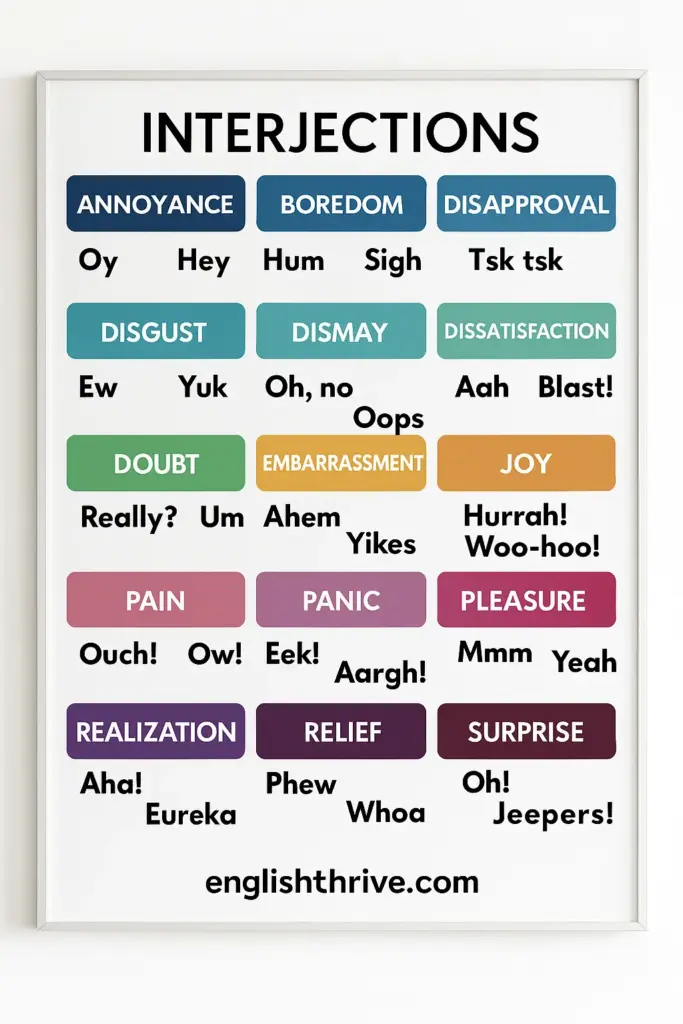Interjections are short words that show how we feel. They help us say things like “wow,” “ouch,” or “hey.” These words show surprise, joy, pain, or anger.
In this article, we will discuss interjections in English with examples and meanings. Let’s begin and learn them in a simple way!
Contents
ToggleWhat Are Interjections?
An interjection is a short word that shows how you feel. It can show joy, anger, pain, or surprise. These words stand alone and end with an exclamation mark.
Examples:
Wow! That’s a nice picture.
Oops! I dropped my pen.
Interjections make English fun and easy to use. They help you speak with more feeling and sound natural. Learning them is simple and exciting!
Types of Interjections with Examples and Meanings
1. Interjections for Annoyance
Examples: Oy! Hey!
Meaning: Show anger or irritation.
Example: Hey! Stop that noise!
2. Interjections for Boredom
Examples: Hm! Sigh!
Meaning: Show no interest or tiredness.
Example: Sigh! This class is too long.
3. Interjections for Disapproval
Examples: Tsk! Tut!
Meaning: Show dislike or disappointment.
Example: Tut! You should be more careful.
4. Interjections for Disgust
Examples: Ew! Yuck!
Meaning: To show dislike or when something is gross.
Example: Ew! This milk smells bad!
5. Interjections for Dismay
Examples: Oh no! Oops!
Meaning: Show worry or mild shock.
Example: Oops! I forgot my homework!
6. Interjections for Dissatisfaction
Examples: Aah! Blast!
Meaning: Show anger when something goes wrong.
Example: Blast! I missed the bus!
7. Interjections for Doubt
Examples: Really? Um…
Meaning: Show uncertainty.
Example: Really? Are you sure?
8. Interjections for Embarrassment
Examples: Ahem! Yikes!
Meaning: Show shy or awkward feelings.
Example: Ahem! I think that’s my seat.
9. Interjections for Joy
Examples: Hurrah! Woo-hoo!
Meaning: Show happiness or success.
Example: Hurrah! We won the game!
10. Interjections for Pain
Examples: Ouch! Ow!
Meaning: Show that something hurts.
Example: Ouch! That bee stung me!
11. Interjections for Panic
Examples: Eek! Aargh!
Meaning: Show fear or sudden shock.
Example: Eek! There’s a spider!
12. Interjections for Pleasure
Examples: Mmm! Yeah!
Meaning: Show that something feels nice.
Example: Mmm! This ice cream tastes great!
13. Interjections for Realization
Examples: Aha! Eureka!
Meaning: Show sudden understanding.
Example: Aha! Now I get it!
14. Interjections for Relief
Examples: Phew! Whoa!
Meaning: Show comfort after stress.
Example: Phew! That test was easy!
15. Interjections for Surprise
Examples: Oh! Jeepers!
Meaning: Show wonder or disbelief.
Example: Oh! I didn’t know you were here!
How to Use Interjections in Sentences
Interjections can be used at the start, middle, or end of a sentence.
Examples:
- Wow! You look great today.
- That was, um, strange.
- We won the match, hooray!
Tip: Most interjections stand alone and end with an exclamation mark (!).
Interjections Chart for Practice
| Emotion | Interjection | Example Sentence |
| Joy | Hurrah! | Hurrah! We finished our project. |
| Pain | Ouch! | Ouch! My finger hurts. |
| Surprise | Oh! | Oh! What a nice surprise. |
| Disgust | Yuk! | Yuk! This tastes bad. |
| Relief | Phew! | Phew! The rain stopped. |
Why Interjections Are Important
Interjections make your speech sound real and full of life.
They help you:
- Show real feelings fast.
- Add emotion to your talk.
- Make stories and chats lively.
For English learners, interjections make speaking fun and easy. They also build confidence and help with listening.
Conclusion
Interjections are short but powerful words! They help you show how you feel and sound natural.
Start using words like “wow,” “ouch,” and “hooray” to make your English fun and clear.


